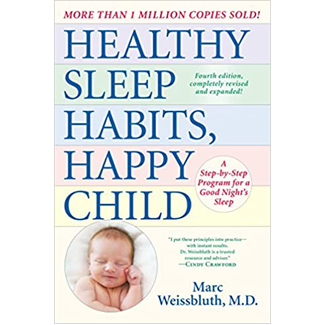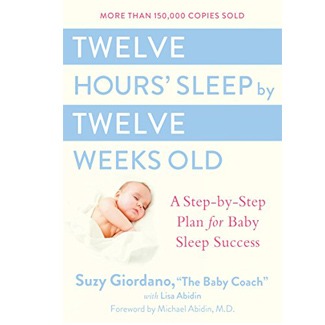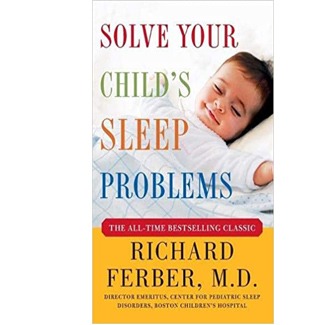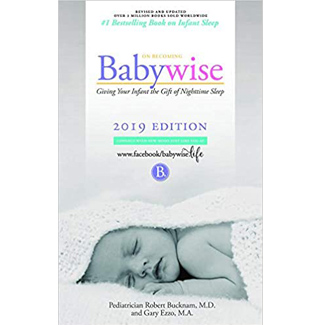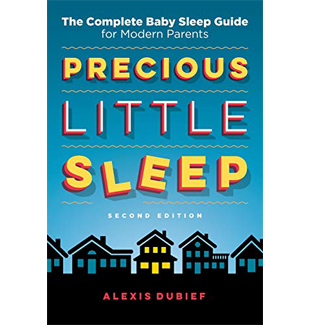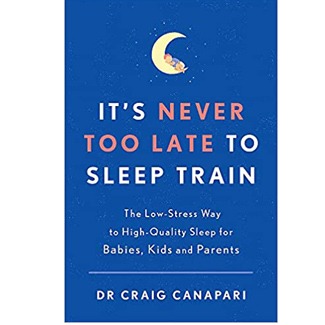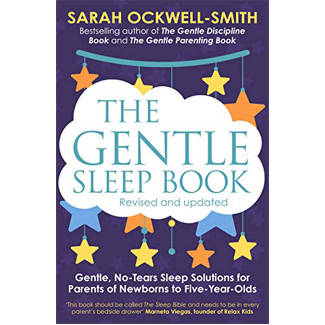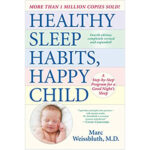Sleep training can feel like a daunting task to take on, but the result is more than worth the trouble. Not sure where to start? Fortunately for you, there are plenty of books written by doctors and sleep experts on the market today, all of which provide tips and tricks to get your little one sleeping through the night. From the famous Ferber Method to a “no-tears” approach, here are the best baby sleep training books available today.
7 Best Baby Sleep Training Books (2026 Reviews)
Best Baby Sleep Training Books
-
1. Healthy Sleep Habits, Happy Child by Marc Weissbluth M.D.
(Most academic — $)
Why it’s great: This book, by Dr. Marc Weissbluth, is based on the author’s forty years of experience as a pediatrician working in the field. Founder of the original Sleep Disorders Center at the Ann and Robert H. Lurie Children’s Hospital of Chicago, Dr. Weissbluth has long since established himself as a baby sleep expert. This book, revised and updated to reflect current research, provides parents with practical guidance on different sleep training methods, problems, and solutions.
Keep in mind: This book isn’t a step-by-step guide, but rather a general overview of sleep training strategies.
Good for: Parents who want advice from a medical professional with specific experience researching children’s sleep.
![Healthy Sleep Habits, Happy Child by Marc Weissbluth M.D.]()
-
2. Twelve Hours’ Sleep by Twelve Weeks Old by Suzy Giordano and Lisa Abidin
(Best for formula fed babies — $$$)
Why it’s great: This book offers simple and effective strategies for parents looking to sleep train their infants. The step-by-step process aims to get babies sleeping twelve hours at night and three hours during the day, all by twelve weeks old. This sleep guide is recommended for new and experienced parents and has been proven to be effective with twins, triplets, colicky babies, and babies with special needs.
Keep in mind: Some customers report that this sleep training guide isn’t as easy to use with babies who are exclusively breastfed.
Good for: Babies who are on a solid feeding schedule as this sleep training method relies on measuring an infant’s milk intake.
![Twelve Hours’ Sleep by Twelve Weeks Old by Suzy Giordano and Lisa Abidin]()
-
3. Solve Your Child’s Sleep Problems by Richard Ferber
(Most traditional approach — $)
Why it’s great: Considered the classic sleep training manual, this book covers the findings and recommendations of leading infant sleep specialist, Dr. Richard Ferber. Often referred to as the “Ferber Method,” this book provides parents with specific techniques to solve a variety of children’s sleep issues, including sleepwalking and night terrors. Featuring charts, schedules, and guides, this book is praised by parents for getting their little one to sleep better and longer in a matter of days.
Keep in mind: Some of Dr. Ferber’s methods do require letting your little one “cry it out.
Good for: Parents who want a quick and effective sleep training strategy.
![Solve Your Child’s Sleep Problems by Richard Ferber]()
-
4. On Becoming Babywise: Giving Your Infant the Gift of Nighttime Sleep by Robert Bucknam and Gary Ezzo
(Best for new parents — $$)
Why it’s great: In publication for over twenty-five years, this book has been updated and expanded to include the authors’ most current recommendations for sleep training. Based on the theory that providing infants with structure and stability leads to better sleep, this book is praised by new parents for being easy to follow and implement. The first in a series of sleep-training manuals, the Babywise books provide instruction and guidance for children up to the age of seven.
Keep in mind: This sleep training book is based on following a specific schedule, which may not work for all parents’ lifestyles.
Good for: Parents looking for step-by-step sleep training instructions.
![On Becoming Babywise: Giving Your Infant the Gift of Nighttime Sleep by Robert Bucknam and Gary Ezzo]()
-
5. The Complete Baby Sleep Guide for Modern Parents by Alexis Dubief
(Easiest to read — $$)
Why it’s great: This book promotes effective and accessible sleeping habits for babies and toddlers through a variety of tips and tools. Leaning on evidence-based research, this book covers newborn sleep strategies, feeding schedules, healthy napping, and toddler sleep struggles. Founder of a podcast, as well as a website designed to improve infant sleep, this author aims to provide sleep training wisdom that’s informative, flexible, and funny.
Keep in mind: Some customers report the writing style in this book relies too heavily on jokes and colloquial banter.
Good for: Parents with a sense of humor as this book is as funny and engaging as it is informative.
![The Complete Baby Sleep Guide for Modern Parents by Alexis Dubief]()
On An Important Side Note… Asher and I (pictured) feel it’s necessary to highlight the value of life insurance for parents with young kids. After extensive research, we discovered that parents can get insured for as little as $10 per month. We use Ladder Life who offers coverage up to $3M per parent (without a medical exam, just a few health questions) and you can apply 100% online.
Get a quote in less than 30 seconds at LadderLife.com ➜
-
6. It’s Never too Late to Sleep Train: The low stress way to high quality sleep for babies, kids and parents by Dr. Craig Canapari
(Best for kids of all ages — $$$)
Why it’s great: This book, written by Dr. Craig Canapari, focuses on creating healthy habits to improve your infant’s quality of sleep. Based on a two-step training plan, this guide includes information gleaned from clinical research and hands-on experience. Parents praise this book for providing guidance on sleep issues for older children as well as infants.
Keep in mind: This book includes several sleep training strategies, including the “cry it out” method.
Good for: Parents looking for a sleep training guide for older kids as well as infants.
![It’s Never too Late to Sleep Train: The low stress way to high quality sleep for babies, kids and parents by Dr. Craig Canapari]()
-
7. The Gentle Sleep Book: Gentle, No-Tears, Sleep Solutions for Parents of Newborns to Five-Year-Olds by Sarah Ockwell-Smith
(Best alternative approach — $$)
Why it’s great: Relying on a gentle approach that doesn’t involve tears or tantrums, this book addresses common sleep issues in children and effective strategies to remedy them. Published in 2021, this book considers how the developmental stages of children play a role in their sleep habits. This book also offers practical suggestions on cultivating a healthy diet and establishing a routine that includes daytime naps and bedtime routines.
Keep in mind: This book doesn’t provide as much science-backed data as other books on the market.
Good for: Parents who do not want to use the “cry it out” method.
![The Gentle Sleep Book: Gentle, No-Tears, Sleep Solutions for Parents of Newborns to Five-Year-Olds by Sarah Ockwell-Smith]()
Healthy Sleep Habits, Happy Child by Marc Weissbluth M.D.
FAQs about Baby Sleep Training Books
-
1. What is sleep training?
Sleep training is a strategy that helps babies learn to self-soothe, which promotes better long-term sleeping habits. As newborns, babies often need to be fed or rocked to fall asleep. Some infants might even refuse to sleep unless they’re in mom or dad’s arms, which is not a safe or sustainable bedtime solution. Sleep training teaches babies to fall asleep on their own and stay asleep for longer periods of time. There are a variety of methods and practices when it comes to sleep training and choosing which one is right for you will depend on your parenting style as well as your little one’s unique sleep habits.
-
2. Is sleep training safe for my baby?
According to the Duke University School of Medicine’s Department of Pediatrics, there are no known risks associated with sleep training. In fact, some studies even report a short-term benefit as sleep training provides better quality sleep for both parents and infants. While there are many different methods of sleep training, the most notorious is the “cry it out” method, which suggests parents let their little ones cry themselves to sleep. While this method is perhaps the most anxiety-inducing for parents, Duke’s Department of Pediatrics reports that there are no long-term negative consequences associated with the “cry it out” sleep training method.
-
3. When should I start sleep training?
Most doctors and experts recommend waiting until your baby is at least four to six months old to begin sleep training. At this age, babies can make it for longer periods of time between feedings. Babies also develop a circadian rhythm at around four months old, which helps establish longer sleep cycles.
-
4. How long does it take to sleep train a baby?
This depends on which sleep training method you use as well as your baby’s individual sleep habits. For some lucky parents, sleep training will only take a few days. Other babies may take longer to get used to falling asleep on their own. There is no set time and unfortunately, as babies continue to grow and develop, they may experience sleep regressions, which can delay or reverse sleep habits established by sleep training routines.
-
5. Which sleep training book will be best for my baby?
This depends entirely on your parenting style and preferences. There are plenty of options to choose from when it comes to sleep training methods. Some doctors recommend letting babies “cry it out” while other experts suggest more gentle methods with specific feeding schedules or bedtime routines. Different babies will respond to different strategies, so your best bet is to start with the one you feel most comfortable with and go from there.
Conclusion
Sleep training is one of the more dreaded milestones parents face, but the challenge is worth the reward. As your little one learns to sleep better, you will too. Most books on sleep training have been written by experts in the field, including doctors and baby sleep coaches, whose research and careers have been dedicated to improving infants’ sleep. There are a myriad of methods and strategies designed to teach babies to sleep through the night. Some rely on specific feeding schedules while others lean on establishing consistent bedtime routines. No matter which method you choose, rest assured that sleep training is one-hundred-percent safe, as studies show the practice poses no long-term risks to babies’ health or development.




